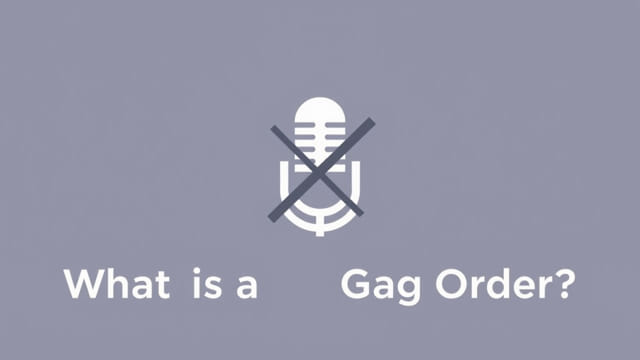In legal and judicial settings, there are certain situations where the freedom to speak publicly must be limited for the sake of a fair trial or public safety. One legal mechanism used to enforce this kind of restriction is known as a gag order. A gag order is an official directive that restricts parties, attorneys, or other involved individuals from making public statements about an ongoing legal matter. This kind of order plays a significant role in balancing the rights of free speech and the necessity for impartial legal proceedings. Understanding what a gag order is, how it functions, and when it is applied is essential in comprehending modern judicial processes, especially in high-profile cases or sensitive investigations.
Definition and Purpose
What Exactly Is a Gag Order?
A gag order is a court-issued order that limits information sharing, specifically speech and publications, related to a legal case. It is typically issued by a judge to prevent individuals involved in a case such as attorneys, witnesses, defendants, or law enforcement officers from disclosing certain information to the public or media. The goal is to protect the integrity of the legal process.
Why Are Gag Orders Used?
The main reasons for implementing a gag order include:
- Preventing pretrial publicity that could influence jurors or the public
- Protecting the rights of defendants to a fair and impartial trial
- Ensuring the privacy and safety of witnesses or victims
- Preserving confidential or sensitive information
In essence, gag orders serve as a protective measure in cases where media coverage or public discussion might disrupt the legal process or violate the rights of the parties involved.
Legal Basis and Authority
Who Can Issue a Gag Order?
Only a judge has the legal authority to issue a gag order. It is typically done in response to a motion filed by one of the parties or, in some cases, on the court’s own initiative. The order must clearly define what types of speech are prohibited and to whom the order applies.
Constitutional Considerations
In countries like the United States, gag orders can raise serious constitutional questions, particularly concerning the First Amendment, which guarantees the right to free speech and freedom of the press. Courts must weigh these freedoms against the right to a fair trial, making gag orders controversial and sometimes subject to appeal.
Types of Gag Orders
Criminal Cases
In criminal trials, gag orders are often used to control media influence and prevent juror bias. These orders may prohibit public statements from prosecutors, defense attorneys, or even the accused. High-profile cases involving celebrities, politicians, or violent crimes are more likely to involve gag orders to minimize media frenzy.
Civil Cases
While less common, gag orders can also be used in civil lawsuits especially those involving trade secrets, class actions, or allegations of misconduct. In such cases, the focus is often on protecting sensitive corporate or personal information.
Government and National Security
In some instances, gag orders are issued in cases related to national security or classified investigations. Here, the concern extends beyond trial fairness to protecting government secrets and public safety.
Examples and High-Profile Uses
Notable Gag Order Cases
There have been several well-known cases where gag orders have been issued to limit public commentary. These include trials involving political figures, corporate scandals, and terrorism cases. Often, these cases attract significant media attention, which increases the risk of prejudice in the court of public opinion.
Impact on the Media
Media organizations sometimes challenge gag orders, arguing that they infringe upon freedom of the press. Courts are then tasked with balancing journalistic rights with the necessity of ensuring justice is served. This tension makes gag orders a complex and often debated legal tool.
Legal Challenges and Limitations
Are Gag Orders Always Enforceable?
Gag orders must meet specific legal criteria to be considered valid and enforceable. They must be:
- Clear and specific in scope
- Narrowly tailored to serve a compelling government interest
- Limited in duration and not overly broad
If a gag order is too vague or overly restrictive, it can be overturned by a higher court. Individuals who violate a gag order may be subject to contempt of court charges, fines, or even imprisonment, depending on the jurisdiction and severity of the breach.
Criticism and Controversy
Critics argue that gag orders can sometimes be misused to shield misconduct, hide information from the public, or stifle legitimate discourse. Advocates of transparency warn that unnecessary or excessive gag orders can hinder journalistic investigation and public accountability, particularly when government or corporate power is involved.
Practical Implications
For Legal Professionals
Attorneys must be extremely cautious when a gag order is in place. Even seemingly innocent comments made to the press can result in sanctions or mistrials. Legal teams often instruct their clients to remain silent in public until the case is resolved or the order is lifted.
For Journalists and the Public
Reporters must navigate carefully around gag orders, especially when covering high-profile trials. While they can still report on public court proceedings, they cannot publish restricted information without risking legal consequences. For the general public, it means that certain information about an ongoing case may remain unavailable until the trial concludes.
A gag order is a legal instrument designed to protect the fairness of judicial proceedings by restricting speech or publication of case-related details. Though controversial at times, it serves a crucial role in maintaining the balance between free expression and justice. Whether used in criminal trials, civil disputes, or sensitive investigations, gag orders must be carefully constructed and applied with judicial restraint. Understanding how they function helps legal professionals, journalists, and the public navigate the delicate intersection of law, media, and constitutional rights. As society continues to grapple with issues of transparency and fair trials, gag orders will remain a relevant and often debated topic in the legal world.
